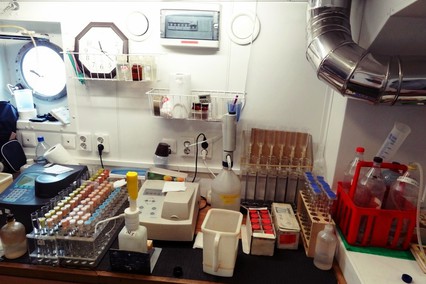Description
Marine chemists combine their expertise in chemistry with an interest in marine environments. A marine chemist is a scientist who focuses his or her career on understanding the chemical composition of the ocean and studying the makeup of underwater structures and landmasses as well as identifying the effect of sea life on different water qualities. Their work -- sometimes called chemical oceanography or marine geochemistry -- could involve determining how fast the polar icecaps are melting, or how pollution affects ocean life.
Tasks:
- Take part in studying the oceans, working to understand the chemical makeup of the seas and its effects on the maritime environment
- Work in a range of environments from arctic to tropical, using scientific methods to determine the chemical composition of relevant materials
- Spend time in or near the ocean, personally collecting samples. Common settings include deep-sea trenches, underwater mountain ranges, coral reefs and shallow tropical waters
- Work with other researchers, combining their skills with teams to further our understanding of the world's oceans
- Use scientific means to analyze the chemical components of marine water bodies
- Perform specific research to create organic matter distribution models, study how bubble cavitation affects marine matter or determine chemical reactions in marine systems
- Work in labs, spending time analyzing slides and drawing conclusions from samples collected in often-disparate locations
- Publish research, present papers and seek to deepen general scientific understanding of the ocean
- Some marine chemists inspect vessels as they enter port for any sign of contamination
- Work alongside marine biologists and marine engineers, marine chemists help to better understand weather cycles and atmospheric changes
Key skills for marine chemist:
- Strong problem solving and critical thinking skills
- An inquiring mind
- Logical approach to solving problems
- Patience and persistence
- The ability to analyse data
- Team working skills
Average salary (2013):
The United Kingdom: £39,105 per year
The United States of America: $108,420 per year
Australia: AU$97,172 per year
Qualifications and training required:
Although some entry-level positions may only require a bachelor's degree, many positions in this field will require completion of a master's or doctoral program. The highest level of education will be necessary for those pursuing research, including both pure researchers and professors. Marine chemistry is a cross-disciplinary field, requiring an understanding of physics, geology, and biology. Further, graduates should have a comprehensive understanding of the applications of methods for testing chemical composition, including mass spectrometry and nuclear magnetic resonance.
Some universities offer specific marine chemistry degree programs, but not all do — at least not at the undergraduate level. Undergraduates hoping to become marine chemists can often break into the field by studying general chemistry, marine biology or biochemistry, to name a few. A degree in the hard sciences and an interest in understanding what makes the sea the sea, from a scientific standpoint, are the key requirements.


